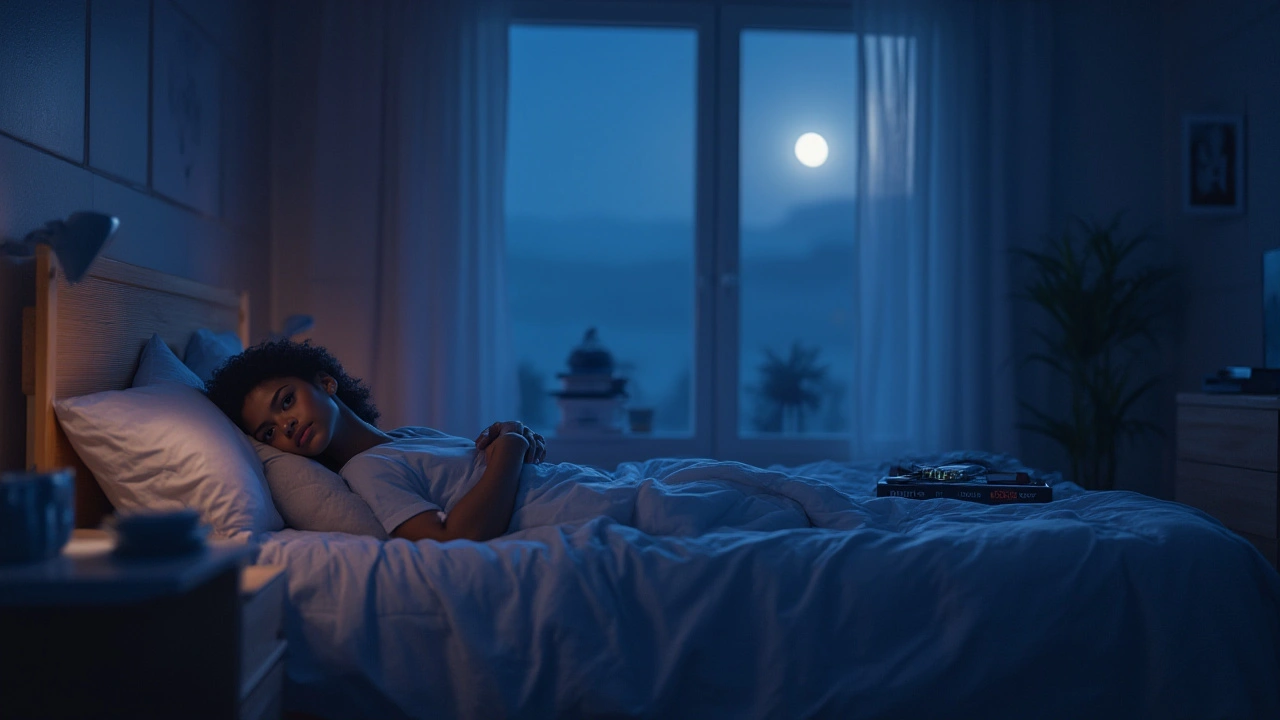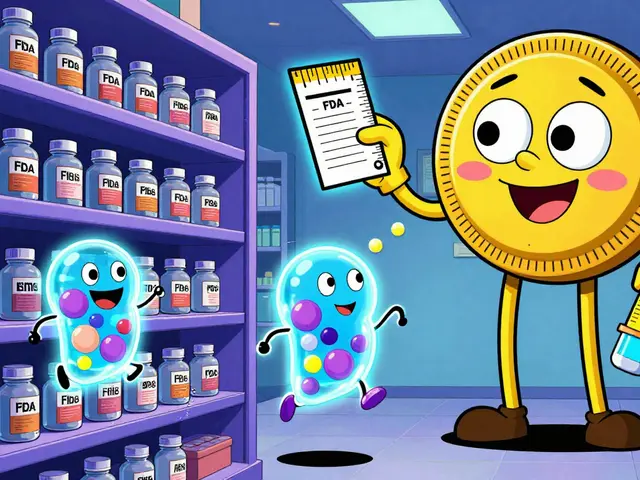Picture this: you hit the pillow, ready to drift off, and then—bam!—your brain is still running last year’s highlights. Or maybe, out of nowhere, you start craving sleep at 4 p.m., nodding off in a team call, barely able to keep your eyes open. Almost everyone wrestles with sleep at some point, but not many know about melatonin, the tiny hormone behind our bedtime struggles and victories. This isn't just another bland chat about “relaxation techniques.” The science, stories, and downright weird facts about melatonin will blow your mind.
Melatonin’s Main Job: The Body’s Nighttime Messenger
Melatonin is like that little friend who tells everyone when the party’s over. Its core job is to signal your body when it’s time to start winding down and get to bed. Produced in the pineal gland deep in your brain, melatonin gets released mostly when it starts to get dark. This is why, when the sun sets, you start yawning, and when morning comes, you feel more alert—or at least, you should. Nature designed melatonin to rise at night and drop off in the morning, syncing your sleep with the earth’s natural light cycles.
Here's something that few people mention: melatonin doesn’t knock you out. It doesn’t “sleepify” you in the same way a sleeping pill would. Instead, it’s like a nudge—a gentle suggestion that it’s time to cool things down and get some rest. If your sleep schedule is on the rocks—think jet lag, shift work, or those long Netflix marathons—your melatonin could be kicking in at the wrong times or not at all. One crazy fact? Even the bright blueish light from your phone can slow melatonin release by hours. That’s why folks who scroll in bed often end up watching the sunrise.
Kids have higher melatonin levels than adults, which goes a long way to explain why they’re conked out by 9 p.m. without needing to count sheep. As you hit middle age, melatonin production starts dropping, explaining why a lot of older adults struggle with middle-of-the-night wake-ups. Some research even shows that blind people—who can’t use visual cues from light and darkness—produce melatonin on a rhythm that can drift over time, making sleep timing a constant adventure.
It’s not just about sleep, either. Melatonin plays low-key roles in regulating body temperature, blood pressure, and even the immune system. Animals in Arctic zones produce melatonin differently in response to long stretches of daylight or darkness—proof of how adaptable this hormone is across the animal kingdom.

How to Boost Melatonin Naturally (and Tips for Better Sleep)
If you ever spent a night tossing and turning, you know how frustrating losing sleep can be. But here’s the kicker: before you reach for the melatonin supplements, you can do a lot simply by tweaking your daily routine. The easiest hack? Respect the sun. Get natural sunlight in the morning—it helps “train” your brain to set your melatonin clock for later that night. This is why campers who ditch electronics and live by sunrise and sunset often reset their sleep cycles in days, not weeks.
At night, your aim is to avoid bright light. That’s not just grandma advice. Studies show even 90 minutes of screen time before bed can delay melatonin release. If you’re stuck with late work or love binging videos, try using red-hued “night mode” filters or blue-blocking glasses. I once convinced my wife, Muriel, to turn on a few dim lamps and read paper books instead of her phone at bedtime. It felt a little old school, but after a week, both of us slept deeper and woke up easier.
Food has its own powers here. Tart cherries, walnuts, oats, and even a warm glass of milk all contain some melatonin or help boost its production. While amounts are tiny compared to what your body makes, every bit helps if your sleep schedule has gone haywire. A late-night handful of pistachios is my personal trick—science says they’re among the nuts highest in natural melatonin.
- Get morning sunlight exposure—just 15 minutes outside can help program your circadian clock.
- Power down electronics or use warm light two hours before bedtime.
- Stick to regular sleep/wake times, even on weekends. Your body loves routines.
- Try a melatonin-rich snack (like tart cherry juice or pistachios) about an hour before lights out.
- Keep your bedroom dark, cool, and gadget-free for optimal melatonin activity.
Some folks try meditative breathing at night—not a direct melatonin booster, but when your stress drops, your body stops making fight-or-flight hormones, letting melatonin do its thing. Regular exercise also makes a big difference, but keep it earlier in the day. Working out too close to bedtime may actually delay your melatonin peak.
Here’s something that always catches people off guard: alcohol sabotages melatonin production. You get sleepy at first, but then wake up at 3 a.m. when the effects wear off. Watch the caffeine, too—coffee or energy drinks late in the day block the build-up of sleep pressure and suppress melatonin release for hours.

Melatonin Supplements: When Do They Help, and Are They Safe?
Supplements can feel like a miracle for people who struggle with jet lag or shift work disorder. Melatonin is available in the U.S. and many countries as an over-the-counter supplement, usually in gummies, tablets, or liquid drops. People take doses that range from less than 0.5 mg up to 10 mg, but here’s a shocker: more isn’t always better. Research out of MIT and Harvard shows that most healthy adults need just 0.3 to 1 mg for sleep, while the mega-doses on store shelves often cause grogginess the next day.
Melatonin kicks in best when you take it 30 to 60 minutes before your planned bedtime—it doesn't hit instantly like some “Zzz-quil” brands promise. And it works wonders for resetting your *sleep hormone* rhythm if you cross several time zones or work nights. Pilots, nurses, and international travelers call it a game-changer, especially if their job flips between nights and days every week.
But melatonin isn’t a magic cure-all. It barely does anything for chronic insomnia where anxiety, chronic pain, or depression are the root cause. Some folks find it helps them fall asleep but not stay asleep. And there’s a real risk that people rely on it as a crutch instead of making lifestyle changes that work in the long run. Quality matters, too: since supplements aren’t regulated as tightly as prescriptions, tests have found melatonin content to vary wildly from what’s listed on the bottle. That’s why I always recommend starting with a reliable brand or, if you're not sure, asking your doctor—which honestly isn’t something guys like me want to do unless we have to.
Kids get prescribed melatonin more than ever, especially for those with ADHD or autism, since their brains often struggle to keep a steady sleep rhythm. But even here, low doses are safest, and parents need to avoid making melatonin the only strategy. Regular sleep routines and turning off screens are still the backbone for better nights.
Do side effects happen? Rarely, but they exist: some people report headache, dizziness, stomach discomfort, or weird dreams. If you’re taking blood thinners, antidepressants, anticonvulsants, or blood pressure medicine, check with your doctor first, since melatonin may interact.
You’ll also hear rumors about melatonin fighting off seasonal depression, helping with prostate or breast health, and even acting as an antioxidant. While early research is promising for these off-label uses, it’s not proven enough to swap your medication for a supplement just yet. But the fact that scientists are digging that deep, looking at melatonin’s role beyond sleep, tells you there’s more to this stuff than late-night infomercials would have you believe.
Bottom line: treat melatonin with respect—natural light, healthy habits, and smart supplement use can add up to way better rest and a happier morning routine. Whether you’re a frequent flyer, a new parent up all night, or someone just desperate for a good sleep, melatonin is one of the simplest biological cues working behind the scenes.







Comments
Sarah Seddon
July 10, 2025 AT 00:30 AMWow, this post really shines a spotlight on melatonin beyond the usual bedtime chatter! I love how it breaks down the role of this hormone in such an accessible yet vivid way. Sleep is such an underrated miracle when you think about it, right? It’s like the body’s secret treasure chest of restoration.
One thing I find fascinating is how natural melatonin production can be influenced by our habits – like how exposure to blue light can totally mess with it. It’s almost poetic that a tiny hormone wields so much power over our nights and days.
Do you guys also think that understanding melatonin better could flip our approach to some sleep disorders on its head? This could open so many doors for natural, less pharmaceutical interventions.
Thanks for lighting up the science behind the scenes!
Tatiana Akimova
July 10, 2025 AT 00:47 AMAbsolutely! It’s like melatonin is this superstar that’s been backstage for too long, and now it’s ready to take center stage. People often just see it as some pill you pop to crash out, but it’s so much more than that.
Natural benefits, sleep cycle regulation, immune support – the list just keeps going. But here’s the kicker: it also has some surprising uses not everybody knows about, like its role in antioxidant defense and possibly even mood regulation.
I’d argue we need to start treating melatonin with the respect it deserves, rather than just a bedtime hack. Anyone here experimented with timing and dosage beyond the usual recommendations?
Ari Kusumo Wibowo
July 10, 2025 AT 01:03 AMY’all, let’s be honest, melatonin gets way too much hype and at the same time not enough credit. The truth is, it’s more nuanced than just ‘take a pill, sleep better.’
Not everyone reacts the same, and if you are not careful, messing with your hormones artificially can backfire big time. I feel like people should focus more on natural ways to boost melatonin – things like regular exposure to sunlight during the day and avoiding screens at night.
This post is a good start, but I want to see more on the potential downsides or long-term effects. Anyone tried melatonin on a regular basis and had weird experiences?
Dan Burbank
July 10, 2025 AT 01:20 AMThis article, while superficially competent, certainly undersells the complexity and physiological grandeur of melatonin’s bioactivity. This hormone, often relegated to the realms of mere sleep aid discussions, actually orchestrates an impressive symphony of circadian regulation and immune modulating effects.
It behooves us, the enlightened, to delve deeper than the pedestrian views presented here and appreciate melatonin’s role through the prisms of endocrinology and chronobiology. The tantalizing prospects of its antioxidant properties deserve far more than passing mention.
Moreover, the undercurrent of the naturalistic fallacy here—suggesting natural-centric tips as preferable—must be questioned rigorously. Natural does not always equate to superior.
Anna Marie
July 10, 2025 AT 01:37 AMI appreciate the balanced tone of the post, especially its practical advice on natural ways to enhance melatonin levels. As someone who struggles occasionally with sleep, I find that small lifestyle shifts—like dimming lights earlier and avoiding heavy meals before bed—really complement any supplements I might try.
It’s also comforting to know about the wider benefits of melatonin beyond just sleep. This holistic view helps me feel more connected to my health routines rather than treating symptoms in isolation.
Has anyone here explored melatonin’s effect on jet lag or shift work? I'd love to hear more firsthand experiences.
Hannah Gorman
July 10, 2025 AT 01:53 AMFrankly, society’s obsession with melatonin as a universal sleep panacea is rather misguided. The literature indicates its efficacy is circumscribed by individual hormonal rhythms and genetic predispositions—facts that are rarely acknowledged in popular discourse.
Moreover, the reductionist portrayal of melatonin as merely a sleep hormone neglects its multifaceted neuroendocrine functions. It is rather disconcerting how casually its supplementation is recommended without due consideration of chronotherapeutic principles.
It would behoove us all to adopt a more sophisticated understanding rather than succumbing to oversimplification.
Abdulraheem yahya
July 10, 2025 AT 02:10 AMReading this, I’m reminded how little many of us actually know about the endogenous processes that govern our sleep. Melatonin is like this silent guardian working unforgivingly behind the scenes to maintain our circadian harmony.
Interestingly, traditional remedies from various cultures have long harnessed natural melatonin boosters without knowing the science. It’s fascinating when modern biochemistry confirms age-old wisdom.
For my part, I’ve noticed that incorporating regular exercise and mindfulness practices also seems to support my natural melatonin rhythm, something this post lightly touches on but deserves emphasis.
mark Lapardin
July 10, 2025 AT 02:27 AMJust a heads-up, melatonin's chemical name is N-acetyl-5-methoxytryptamine, and it’s synthesized from serotonin in the pineal gland. The article does a decent job, but a mention of its biosynthesis pathway could have enriched readers’ understanding.
Also, melatonin's peak secretion typically happens a couple of hours after darkness onset, syncing with our circadian pacemaker—the suprachiasmatic nucleus. Disturbing this sync, say with artificial light, disrupts melatonin release, which impacts sleep quality.
It's imperative for anyone using supplements to understand these mechanisms for better timing and efficacy.
Sarah Seddon
July 10, 2025 AT 02:43 AMOh, that’s a great point about timing and the biochemical intricacies! It’s like the difference between putting fuel in a car at the right time vs. just dumping it randomly. The body’s rhythms are so beautiful and delicate.
I would love to see more posts that dive into these molecular details without losing that warm, accessible touch – it might help folks feel empowered rather than overwhelmed.
Also, regarding light exposure, I recently started using warm amber lights at night and cutting screens early. It’s been a game-changer for my sleep hygiene, highly recommend it!